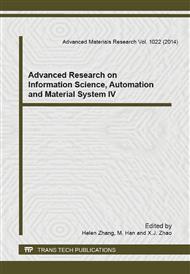p.329
p.333
p.337
p.341
p.345
p.349
p.353
p.357
p.361
Research on the Monitoring of Internet with Public Opinions Based on Micro-Blog in Universities
Abstract:
It is so important to monitor Internet public opinions based on micro-blog in universities that universities are able to grasp public opinion trends comprehensively and to make correct guidance of public opinion timely. In this paper, we propose a monitoring platform of micro-blog public opinions via combining artificial participation with computer technologies. The technologies of search engine and date mining are applied to this platform including topic detection and tracking, hotspot detection and emotional tendency analysis to mine and monitor micro-blog public opinion automatically. This platform is able to make full use of the advantages of the professional group of micro-blog public opinion monitoring to increase the effectiveness and efficiency of monitoring and guidance work of micro-blog Internet public opinions in universities.
Info:
Periodical:
Pages:
345-348
DOI:
Citation:
Online since:
August 2014
Authors:
Price:
Сopyright:
© 2014 Trans Tech Publications Ltd. All Rights Reserved
Share:
Citation:


